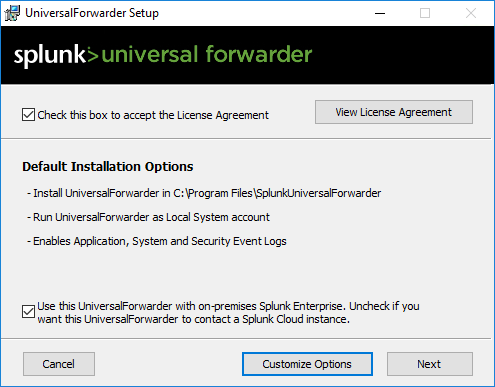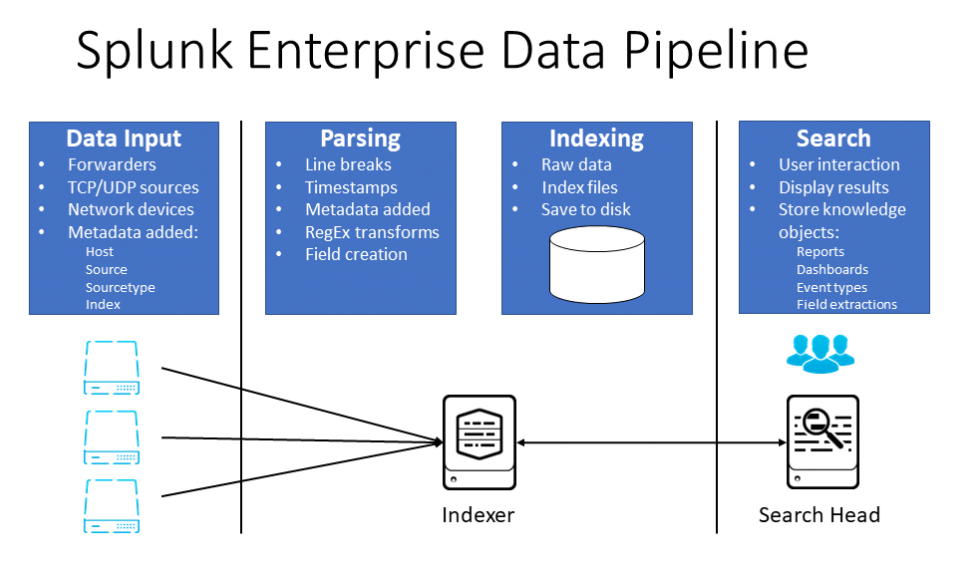
- #Splunk enterprise server how to#
- #Splunk enterprise server driver#
- #Splunk enterprise server software#
- #Splunk enterprise server password#
Scroll down and click on validate button, to check if you are able to successfully connect to your SQL Server instance.Here is a screenshot of the configuration that I have done for your reference.
#Splunk enterprise server driver#
#Splunk enterprise server password#

If thenįILE_LINES=`wc -l $AUDIT_FILE | cut -d " " -f 1`Īwk -v START=$SEEK -v OUTPUT=$SEEK_FILE 'NR>START ' $AUDIT_FILE | tee $TEE_DEST | /sbin/ausearch -i 2>/dev/null | grep -v "^-" # assertHaveCommandGivenPath /sbin/ausearch SEEK_FILE=$SPLUNK_HOME/var/run/splunk/unix_audit_seekfile # See the License for the specific language governing permissions and # WITHOUT WARRANTIES OR CONDITIONS OF ANY KIND, either express or implied. # distributed under the License is distributed on an "AS IS" BASIS,
#Splunk enterprise server software#
# Unless required by applicable law or agreed to in writing, software # You may obtain a copy of the License at # you may not use this file except in compliance with the License. # Licensed under the Apache License, Version 2.0 (the "License") Therefore, I changed the rlog.sh under /opt/splunk/etc/apps/Splunk_TA_nix/bin/ to the following: #!/bin/sh Unfortunately, the rlog.sh script, which is responsible for reading the /var/log/audit/audit.log file, is not working for me. # This file controls the configuration of the audit daemonĪfter that, we restart the auditd daemon with the following command: system auditd restart In order to read the /var/log/auditd/audit.log, we will change in /etc/audit/nf the log_group to splunk: # As we installed Splunk as splunk user, which is a non-root user, we have to perform some changes in order to be able to read these log files. In my opininon, the files /var/log/messages, /var/log/secure and /var/log/audit/audit.log are worth to collect. You can enable it by changing the disabled value to 0 and adding the index value: # Copyright (C) 2018 Splunk Inc. The first part of the nf configuration file uses different bash scripts to collect information about the Linux server. We will copy the nf configuration in the new folder: cp default/nf local/ Instead, you should create a local folder and make your changes there: mkdir local Normally, you should never edit the files in an apps default folder. We connect over terminal to our Splunk server and navigate to the Splunk Add-On for Unix and Linux folder as splunk user: cd /opt/splunk/etc/apps/Splunk_TA_nix In the next steps, we will configure the Splunk Add-On for Unix and Linux. tgz file by clicking on Durchsuchen/Choose and then click on Upload: We login to our Splunk instance and click on Manage Apps:

In the first step, we will download Splunk Add-On for Unix and Linux from splunkbase: We will monitor the logs of the Linux Server running Splunk. This tutorial assumes that you have already installed Splunk as described in this blog post. We will cover different logging/monitoring options for Linux Server using Splunk Enterprise.
#Splunk enterprise server how to#
In this blog post, I will explain how to monitor a Linux Server with Splunk.


 0 kommentar(er)
0 kommentar(er)
